Here’s the scenario: you need a website – for yourself or a client – with some more advanced community features.
That might mean advanced user accounts, forums, private messaging, chat, better commenting, or any other manner of features to enhance the way users can interact with a website.
Most of us here will be familiar with using WordPress to build websites, and it’s always useful to have its post features available on any site. Plus, WordPress provides a great framework for developing websites – what with its themes and plugins system. But if you’re looking for something a bit more intense, is WordPress really the way to go?
There are lots of different options for powering the community side of a website, WordPress or otherwise. This article will examine some of the options and ask which is the best to use – on, or alongside, a WordPress installation as the case may be.
Planning a Community Site
As ever, it must be emphasized that planning is one of the most important parts of creating a website, to ensure you include features its users want to use.
Especially true for sites with lots of functionality, it’s vital to make sure the site is going to be pleasant to use before embarking upon trying to build the community. People simply won’t stick around if it’s a pain to use.
Go through this checklist when deciding how you want your site to work:
1. Why Is the Community There?
Is this site supposed to be solely a community for the sake of discussion? It’s important to distinguish between this and, say, a community discussing a product that is also on the site.
Especially for communities that exist for discussion’s sake, the discussion software is going to need to be top-notch. You’ll need to consider if WordPress’s options will give you enough scope for this.
Meanwhile, if your community exists alongside a website with a product on it, you’re going to want to keep continuity across the website. This is where WordPress might be a particularly good idea, because you’ll run both the main site and the discussion areas on the same system.
2. What Do You (Or Your Client) Want From the Site?
If your community side is going to be for support, what’s going to be the best way to deliver that? You must also consider how big you want the community side to get, and whether you’ll have the time to maintain it. Having something overly complex and time-consuming isn’t a good idea for long-term maintenance.
Also, if the client isn’t the most comfortable with complex technology, the site will need to have an easy enough backend for them to manage.
3. How Will People Interact?
You’ll need to decide which specific features will be best for your site. Forums are a popular choice, but live chat is often popular too. If users will be interacting with each other as well as the site administrator, a good profile system is probably a nice idea. If you want to be able to moderate your site you’ll need to find software that enables you to see everything too.
Come up with a feature list, and consider how each one will be used prior to selecting the software. That way, you’ll be able to fulfil all your needs but not have superfluous features that are difficult to manage.
Once you’ve decided all these things, it’s time to start looking at the options.
Community Options on WordPress
It can be quite safely assumed that any other part of the community site you’re developing will be through WordPress – that is, pages and posts. There are a couple of features already available within the WordPress core for community:
- Commenting. This can also come with multiple layers so users can respond to each other as well as the article.
- User accounts. These can be set to enable anyone on the web to submit content to a blog.
- Multisite. This can be put in place (find out more on the Codex) and can enable users to register their own blogs on the network, too.
However, that’s about it, and if you want to expand outside of those you’re going to need to use the plugins system. That said, there are a number of very advanced plugins that work wonderfully for WordPress.
A few of the best WordPress community plugins include:
1. bbPress
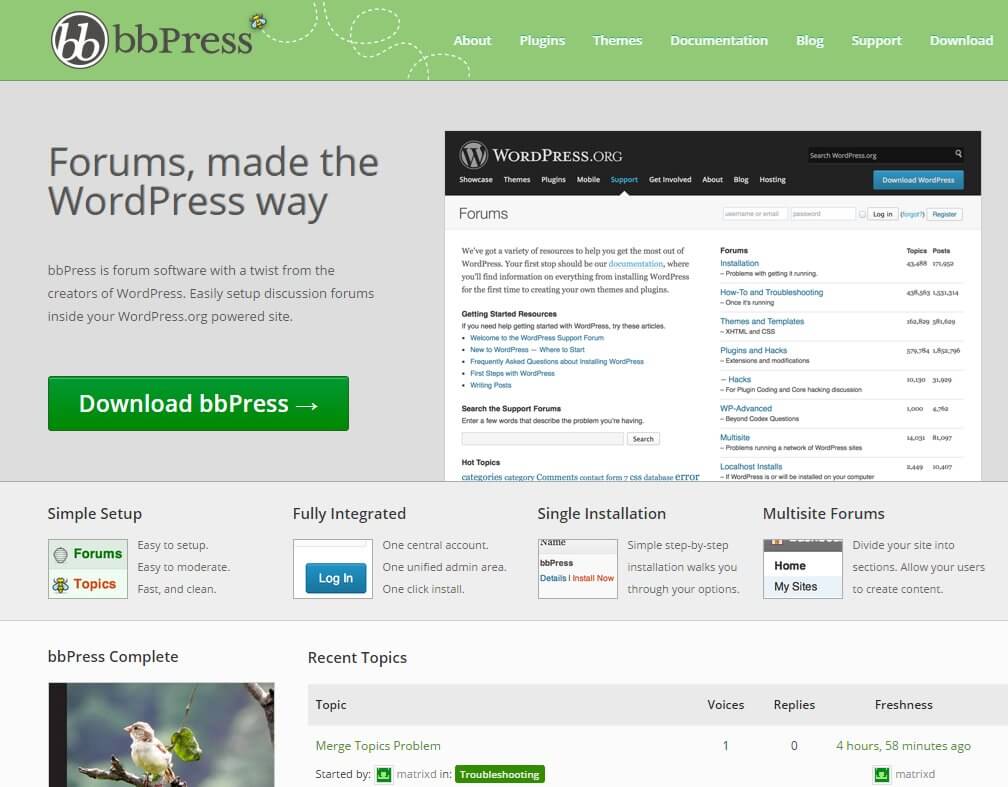
bbPress enables forums, subforums, topics and replies to be created and edited. Users can do this with an editor on the front end of the site, while those with access to the dashboard can use the traditional WordPress interface as well.
With its own plugins library to expand functionality, bbPress also brings widgets and new user roles to the site. Dynamic shortcodes are also useful for placing forums and topics on specific pages in addition to the customizable pretty permalinks.
bbPress works with multisite so multiple sites can have different forums on them.
2. BuddyPress
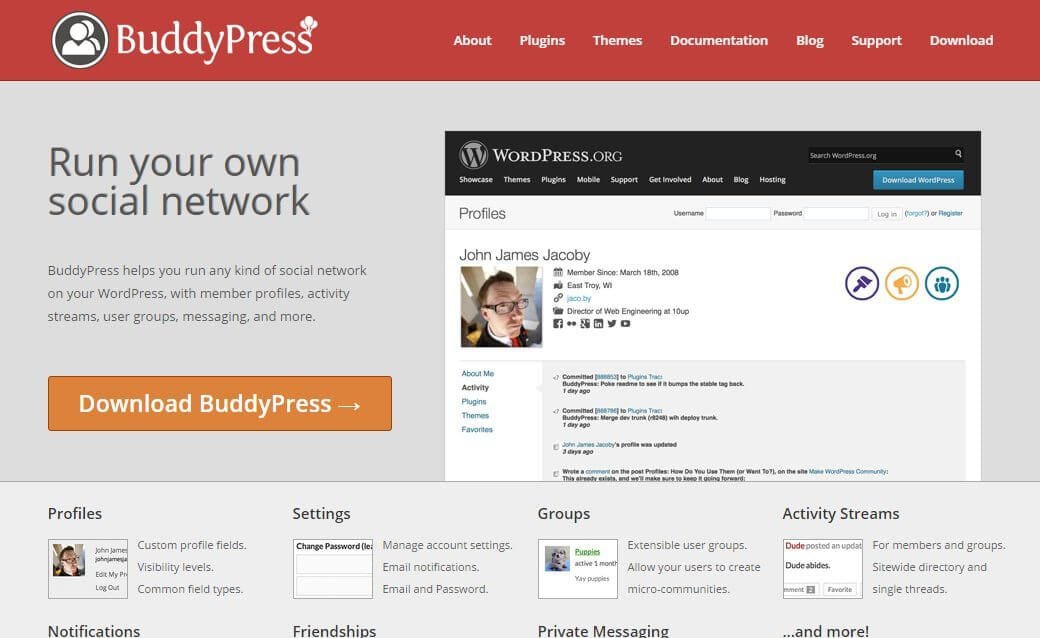
Like bbPress, BuddyPress is developed specifically for WordPress. It features a plethora of features that can be turned on or off as required.
BuddyPress gives each user a user profile with different options you can add for them to customize. You can also enable the sending of private messages between users, and users can also become friends with one other.
Notifications show tagging of users in the public activity feed, and forums if bbPress is enabled. bbPress also integrates with the Groups feature, which enables – with various permissions – users to group together and discuss things in their own sections. With multisite enabled, BuddyPress will collate and list blogs and their latest posts.
BuddyPress also has a number of plugins listed in its own directory. One is BuddyPress Moderation, which enables users to report inappropriate content.
BuddyPress can be integrated with plenty of themes and also has its own directory. However, it is important to make sure all its features work with a specific theme, because there are also plenty of themes that don’t support it fully.
3. Jetpack
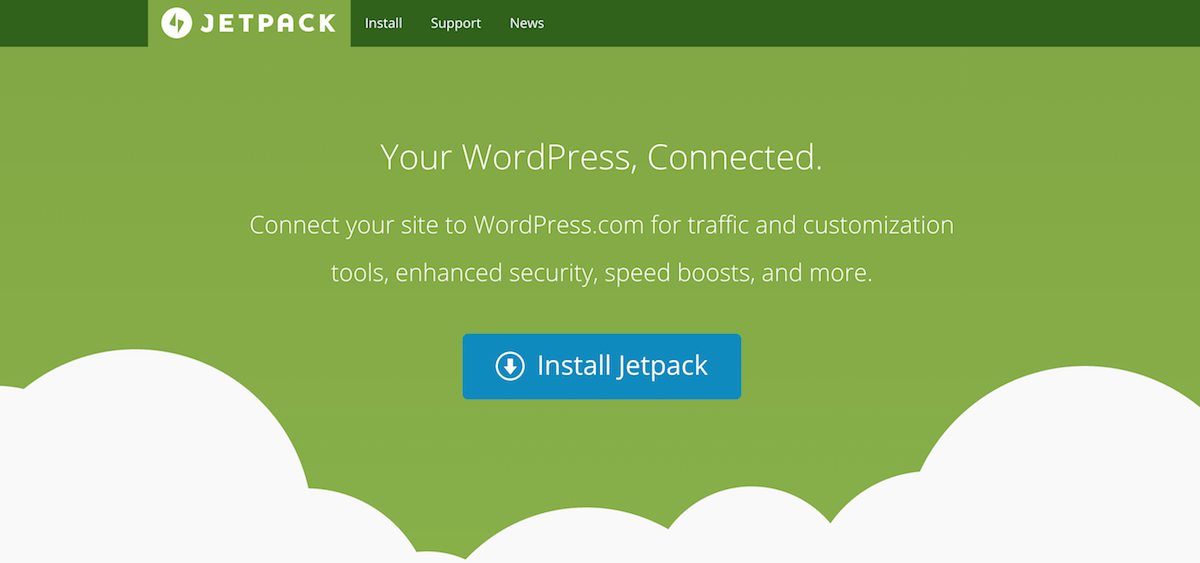
Another very familiar plugin for the vast majority of WordPress users, Jetpack features an improved comments and subscriptions system. If you’re looking simply to improve community interaction on your blog, this is a good way to go. If you are already using Jetpack subscriptions and want to switch to something else, you can follow our guide on how to move from Jetpack subscriptions to another email marketing service.
4. Chat

WPMU DEV’s Chat plugin is probably the most fully-featured WordPress website chat plugin. It enables public and private chats between the administrators and other users. You can also customizable how it looks, including colors and where it’s positioned on the site.
Live chat can be a good way of delivering live support for products, as well as pre-sales advice. Within a community site, it can also be a place for community spirit to foster, where members get to know each other better. If you can get people visiting your website regularly to make contact with friends, that’s great for increasing your traffic and promoting products.
There are plenty of other ways to add similar functionality to WordPress using a variety of different plugins – these are just the most common, and some of the most feature-rich, regularly updated ones. The support with these (and other WordPress) plugins is characteristically good and you’re also unlikely to find too many security holes – and even where they do crop up, they’ll be fixed quickly.
In addition to these advantages of WordPress, it’s nice for all users – the administrator (perhaps your client) and regular users – to have every account running off the same system. From the administrator’s point of view, everything being on a single WordPress dashboard is going to be much easier than a fragmented system with multiple control panels for different bits of a website. And, as much as one might try to unify design, WordPress plugins are always going to fit in with the main site much better than having WordPress to run one part and some different software for another part.
Community Software Alternatives to WordPress
That said, there are alternatives to using the plugins listed above – there are a number of good ways to provide a community with the software to flourish outside of WordPress. These are available in many incarnations, both free and open source, like WordPress, and paid-for options.
1. ZetaBoards
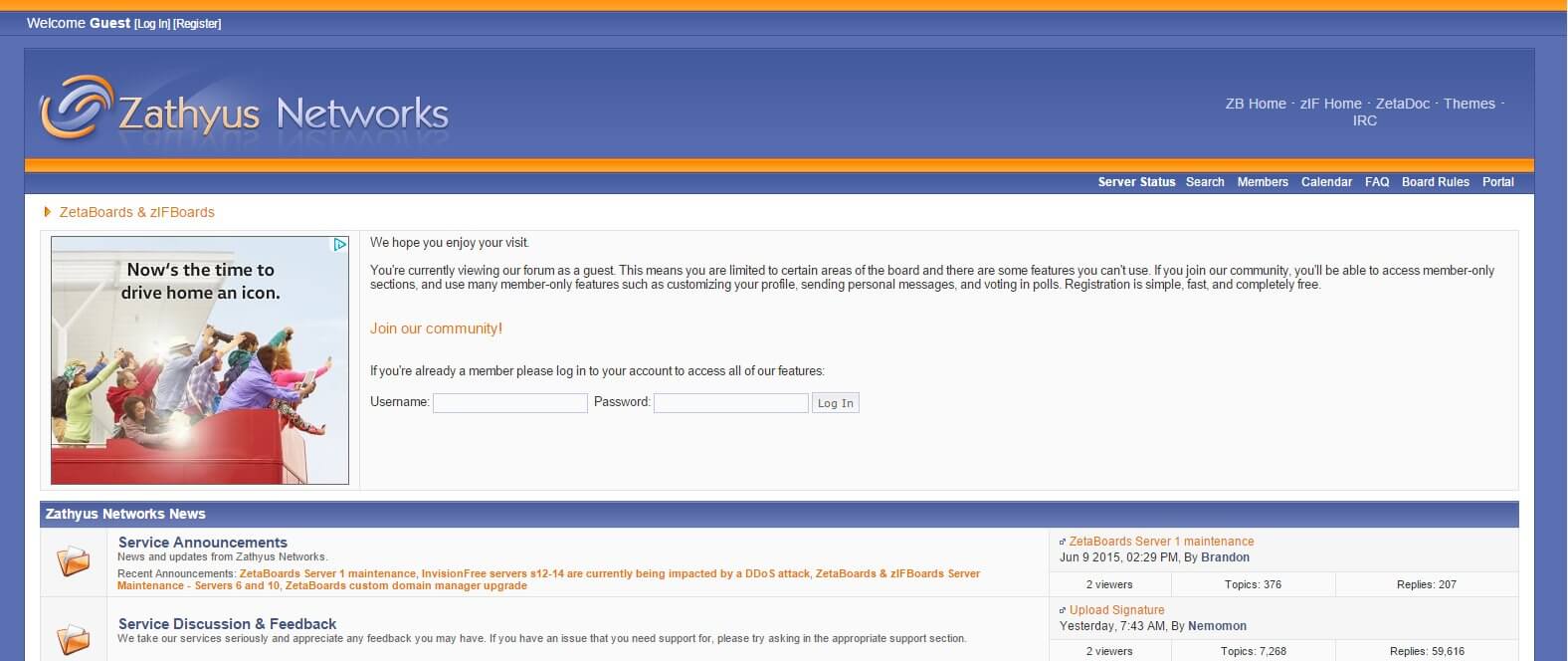
Some solutions, such as Zathyus Networks’ ZetaBoards will even host a forum complete with chat box and full-featured admin panel. This is a completely free option, but there are some downsides.
The warning with this has to be that the URL isn’t going to be great for SEO and using a custom one isn’t cheap. Additionally, having three separate places to login (the main WordPress site, the front end of the forums and the back end of the forums) may not be entirely appealing to clients. Having another company’s ads on the forum may also be an issue, and generally adding new features in the future won’t be a possibility.
However, for a community built specifically around the forum and with maintenance work carried out on the software (as would happen easily with WordPress too), this is one of the best options around, with many useful features.
2. vBulletin
For self-hosted, paid options outside of WordPress, vBulletin is the obvious choice.
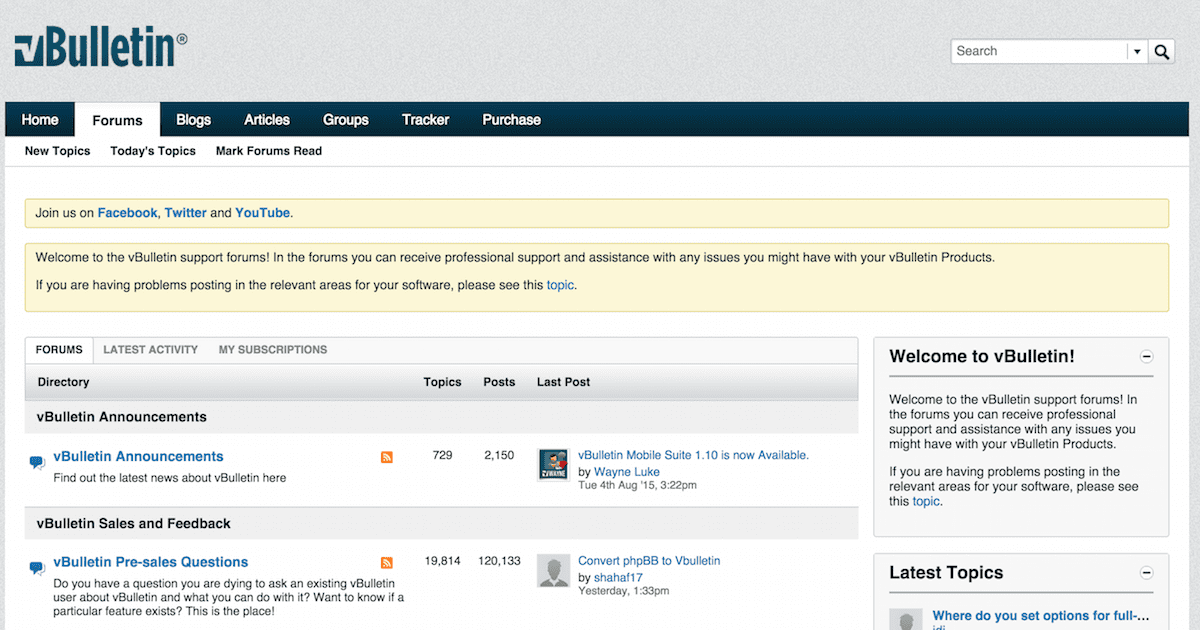
It doesn’t come cheap by any means (you’re looking at upwards of $249 depending on your package) but if you want a forum system with which you can do pretty much anything, this is it. Its other CMS-style features have nothing on WordPress and it will be a departure from any other part of the website’s styling.
vBulletin can also be self-hosted so the URLs are perfectly good for SEO, unlike the ZetaBoards option (despite the latter actually having a lot of the more advanced features of vBulletin, surprising given the price difference).
3. phpBB
Lovers of open source we obviously are, so phpBB must also get a mention.
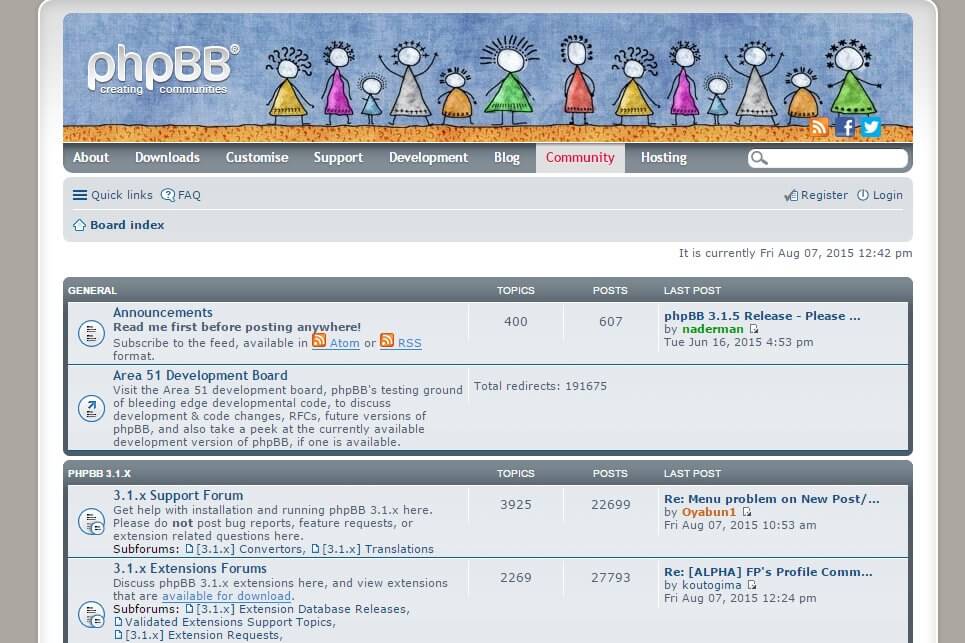
phpBB will deliver much the same as vBulletin will, just without the premium cost. However, along with it, you may encounter issues with the CMS (compared to WordPress) and the departure from any style one may have on a main website.
Choosing Which Way to Go
The only reason, really, to depart from the WordPress plugins in favour of other software like the above examples is if they have very advanced, necessary features that you don’t think you can replicate on WordPress.
Of course, if you’re building a website that is primarily community-based, it’s important to make sure you have the best features for it. If you settle for something substandard when it’s the main – or otherwise quite significant – part of the site, you’re setting yourself up to fail.
For most people, WordPress will be a good choice – like with the core version, there is a good amount of support available and reliable updates are forthcoming. Using just WordPress to power the whole site means everything is in one place and there’s continuity for administrators and users alike. Plus, keeping everything under one dashboard makes it easier for any clients to learn their new software. You’ll also benefit from only needing to make stylistic changes in one place, with all the power of WordPress’ themes system.
If, for whatever reason, WordPress isn’t suitable for your personal site, there is one other option worth considering rather than tacking extra software onto the side of an installation: hire a company who can create a bespoke system. Your needs are presumably pretty specific if the WordPress option won’t work for you, so it’s worth considering.
If you do go for an additional piece of software, it’s probably a good idea to make sure your license allows you to edit it and tailor it to your needs.
Conclusion
This post has covered a lot – if there’s one big thing to take away from it, it’s to think through what you want first, then choose what you’d like to use to do it.
Don’t settle for anything second-class if you want to make such a website.
WordPress, despite its sadly too-infrequent use as such, can actually be very effective in building community sites. While it’s not designed specifically for that use on the core, the plugins available are exceptionally good and should fulfil most of your needs.
Best of luck in building a flourishing community!
Do you have a site with a large, active and interacting community? What do you use to power it? Is there anything you’d recommend? Please do tell us about it in the comments.
Image Credit: Marish / ShutterStock.com









Another great article.
Thanks
Hi,
Somebody have an example of a buddypress integration in a Divi theme? Is it working with the last release of the buddypress plugin?
Thank you.
I prefer BuddyPress as a WordPress community plugin because of its infinite list of functionalities. BuddyPress can help you run any kind of social network on your website and enables users to interact with each other. You can create communities in WordPress and the best part is it can be extended with a number of third party components.
There was a demand to make an LMS like LearnDash more community friendly and we chose BuddyPress to be integrated with LearnDash as it fit the bill perfectly. If you need a full-scale community plugin then I would recommend BuddyPress.
Is Buddypress ever going to be compatible with DIVI? That would be a match made in heaven!
This was another great article. JayGee Dezigns, LLC have created a service called Managed Website Services that helps its clients manage their website, with developer capabilities.
What about MediaWiki?
I have the “mycred” point system on my news and community site. It awards users that comments on posts, votes in polls and open threads in the bbpress forum and much more.
Link: https://wordpress.org/plugins/mycred/
Hello,
To create a community site, there are also social networking engines: Oxwall, … WordPress is one of the solutions for community sites but if you want a full community website, it’s not the best. But it’s perfect to have a section dedicated to discussions and communities.
You can see a platform to create and host your discussion forum here: here http://www.forumotion.com/ !
I’m shocked that you left out the simple:press plugin from http://simple-press.com/ – a full-featured forums plugin that integrates seamlessly with WordPress.
Also, WPMUDEV’s chat fails miserably compared to CometChat from https://www.cometchat.com/wordpress-chat
One of the impressive niche to asked and solution with us. WordPress,One of the best way to express itself.There several kind of features or well secure make Website.It’s looking so great of another toughest language.It’s reduce time,more effective and much capable to store data vary easily.Thanks for sharing.
I’m completely in love with EasySocial for Joomla!, if you are looking for more Facebook like functionality than a forum this is the way to go http://stackideas.com/easysocial#feature-story
I think you should add flarum.org as an alternative for building a modern forum.
When it comes building a serious community, social website you will have to go with something built exclusively for such things like forum software, i can’t possibly think of using WordPress in this case.
XenForo is my first pick for a forum/community software, very interactive and user friendly and there lots of great addons to extend it.
I’ve been trying to get BuddyPress to play well with Divi, but without much success. Would bbPress integrate more easily?
Yep, bbpress works smoothly with Divi but you need a lot of tweaking to get the exact styling for BuddyPress. I’ve been there twice…
We have moved to a hybrid, using existing Facebook and Google+ groups, connected to an SEO value statement with WordPressMU and Delivery theme and interactive calendar for call to action
What are your thoughts on Ning? I’m looking at not only a community site, but paid and free membership options (via WishlistMember) and drip feed of content.
I have used most of the stand alone forum softwares and have found a favorite. Check out Xenforo – I can’t say enough good things about it. You can see a working installation here http://www.palmpedia.net/forum
For full community sites, as in a home owners association there are specific social networking solutions like Nextdoor and pre-developed full blown systems from people like hoa.com.
This is a timely article for us 🙂 We run a time bank for entrepreneurs – we recently decided to split our site into two parts- the buddy/press community/time bank part (WordPress) and a separate marketing/blog site. We are using the gorgeous Divi plug in for that. (but would Divi work with BuddyPress – we might move the other site over to that too – so easy to make it look good!)
For what its worth, our forum is actually on Facebook because that is where people hang out most of the time. I’m also seeing a lot of communities pop up on Slack.
I can report that DIVI 2.4 works very nicely with both BuddyPress and BBPress. The biggest limitation I have found with these two plugins is the lack of native flexibility with where and how I can display forums and user groups but there are some excellent plugins for those functions as well.
There’s also peepso for WordPress that I’m giving some attention to. Though I’ve got some time before I focus on building a community via my site.
Nice article! I just wanted to also offer some additional forum possibilities for communities for anyone else reading this article – XenForo (a paid self-hosted solution), MyBB (free, self-hosted or can be hosted for free via Icyboards) and Jcink (freely hosted with premiu options).